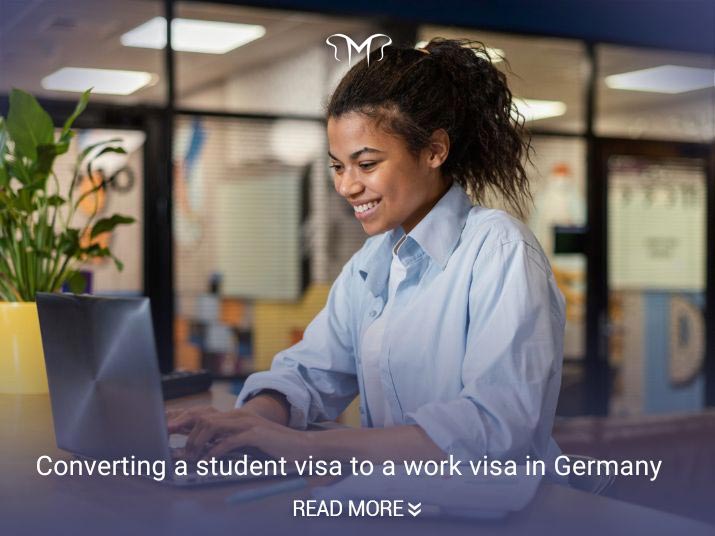
Converting a student visa to a work visa in Germany, is that possible?
Germany is one of the sought-after destinations for international students who wish to study abroad. Currently ranked fifth in the list of countries with the highest number of international students, it follows the United States, the United Kingdom, Canada, and China. Not only does Germany offer high-quality education, but it also provides ample opportunities for you to stay in Germany as an international student after completing your studies. If you have completed your education in Germany as an international student, you may be eligible to convert your student visa into a work visa. In this article, Monarch Migration Institute discusses the conditions and process of converting a student visa to a work visa in Germany.
Student Visa for Germany
Germany, home to some of the best universities and the third-best student city in the world, Munich, is a popular destination for students from around the globe. If you also intend to study in Germany, you should know that without obtaining a German student visa, it is not possible to migrate to this country as a student.
In other words, for migrating to Germany through education, the first step is to get admission from one of the universities in this country, and then you need to visit the German embassy in your home country to apply for a student visa. To obtain a German student visa, you will need the following documents:
- Admission letter
- Identification documents
- Educational certificates (the degree preceding the chosen level of study; for example, a high school diploma for undergraduate studies in Germany or a bachelor's degree for postgraduate studies)
- Language certificates
- Motivation letter
- Proof of financial means
German Work Visa
If you want to work in Germany and do not have the nationality of an EU country, you need to apply for a German work visa. There are various types of German work visas available for immigrants, and applicants should choose the best option based on their circumstances.
The most important German work visas are:
- Germany Job Seeker Visa (Job Seeker)
- Germany Skilled Worker Visa (Skilled Worker)
- Germany Blue Card (Blue Card)
- Germany Opportunity Card (Chancenkarte)
Can a student visa be converted to a work visa in Germany?
Yes, you can convert a student visa to a work permit in Germany. However, before considering this change, you must meet the conditions set by the German immigration authorities. The process of converting your student visa to a work permit can be complex and challenging, but it is not impossible.
Many international students succeed in obtaining a work permit and residency in Germany, and you can be a part of this program. With the necessary information and documentation, you can increase your chances of converting your student visa to a work permit in Germany. So, if you have studied in Germany with a student visa and are now eager to explore exciting job opportunities in this beautiful country, you are in the right place!
Read more: Legal Ways to Immigrate to Germany 2024
Conversion of Student Visa to Work Visa in Germany after Graduation
Non-European Union students who wish to work in Germany after graduation must extend their residence permit. This permit allows graduates to stay in Germany for a maximum of 18 months to find employment related to their studies. Learning the German language is essential to prepare for life and work in Germany. Not only does language proficiency help you find a job more quickly, but it also aids in making new friends. While it is true that English-language jobs exist in Germany, for professions such as human resources, accounting, marketing, consulting, medicine, or law, skilled individuals with proficiency in the German language are usually preferred.
Health insurance is mandatory for working in Germany. Germany upholds strict regulations to ensure that all residents have access to proper healthcare coverage. Germany boasts one of the world's top healthcare systems, making having health insurance from German providers highly valuable. According to the law, health insurance is compulsory not only for foreign skilled workers but also for individuals entering and residing in Germany, regardless of the duration of their stay. According to German regulations, foreign workers automatically have the right to public health insurance. However, if their annual income exceeds 66,600 euros until 2023, they may be eligible for private health insurance.
Read more: What is student insurance in Germany and what are its types?

Extending Residence Permit: The First Step to Converting a Student Visa to a Work Visa in Germany
Extending your residence permit after graduating from university is the first important step to obtaining a work visa. With this extension, you are granted an 18-month stay in Germany to search for a job. During this period, you can reside in Germany without needing additional permits from the Federal Employment Agency. To extend your residence permit, you need to apply at the local Foreigners' Registration Office in Germany. For this application, you will need various documents, including a passport, university degree certificate, proof of health insurance, and proof of financial stability.
If you return to your home country after studying in Germany, the process will be slightly different. Instead, you will need to apply for a six-month job search visa through the German embassy. Additionally, when applying for a job in Germany from your home country, there are several different pathways available to you: obtaining a German job offer visa, the German EU Blue Card, and the German job seeker visa are all ways to enter the German job market.
Conversion of Student Visa to Work Visa in Germany and Examination of the Job Market in Germany
Germany, thanks to its strong and secure economy, offers numerous job opportunities for graduates. Companies throughout the country actively seek individuals with German university qualifications. While still in university, you can follow job opportunities through university bulletin boards. This allows you to better understand available employment options and apply for positions that interest you upon graduation.
There are various websites with job advertisements in Germany. One of these platforms is the EURES Job Portal, where you can discover thousands of opportunities that match your education level, experience, and interests. Additionally, you can find job ads in local and national publications, as well as in popular student hangouts such as cafes and university areas. If you haven't immediately found a job in your field after graduation, don't worry. You can still look for part-time or temporary work while seeking your ideal job. Some of the in-demand jobs in Germany include:
- Finance and Accounting
- Technical and Engineering
- Information Technology
- Sales and Marketing
- Teaching and Education
- Healthcare
Changing a student visa to a German residence permit
After finding a job that you wish to pursue, you must apply for the EU Blue Card, which serves as the primary residence permit for university graduates who have graduated from German universities and come from non-EU countries. To be eligible for the Blue Card, the applicant must meet specific requirements, such as having a university degree and a job contract.
The EU Blue Card is a residence permit typically issued for a four-year period. However, if the employment contract is for a shorter duration, German authorities will issue the EU Blue Card for that period, with a three-month extension. If the conditions are met, the card is renewable. After 33 months of residence in Germany, individuals holding the EU Blue Card can apply for a permanent residence permit, allowing them to stay in Germany permanently.
Conditions for converting a student visa to a work visa in Germany
First, you should know that online applications are not possible, and you always need to personally visit the embassy of your country or the immigration office (Ausländerbehörde) in your city in Germany. For each residence permit, there are different conditions, but the basic principles are that Germany wants to see if you have the following:
1. Sufficient funds to stay in Germany.
2. You have health insurance.
3. You have a place to live.
For applying for any type of German visa, you need a valid health insurance document in Germany. Embassies and immigration offices do not require comprehensive coverage, and a simple migration entry insurance from Feather is sufficient. Financial stability can be ensured through various methods:
- Bank account statement with a minimum of 10,000 euros in the account.
- Financial support from family and others.
- An employment contract with specified salary and benefits.
- Income, funds, assets, and financial status of parents.
Documents required for converting a student visa to a work visa in Germany:
1. Filling out two copies of application forms.
2. Two passport-sized photos.
3. Valid passport.
4. Proof of residence in Germany (utility bill or address of residence).
5. Health insurance.
6. Job offer or employment contract.
7. Educational documents.
8. No criminal record.

How to Convert a Student Visa to a Work Visa in Germany
Here are the steps for converting a student visa to a work visa in Germany:
1. Complete Your Research
Before entering the job market, you must halt your status as a student. This means completing your studies or meeting the academic requirements for your field of study. Ensure that you have finished your education or fulfilled the criteria set by German authorities. You cannot convert your student visa to a work visa while still being a student.
2. Find a Job Offer
Once you have completed your education, it's time to start job hunting. Look for job opportunities relevant to your field of study. The more closely the job offer aligns with your expertise, the better your chances of obtaining a work permit. The German job market may vary in demand based on the time of year and the type of job you seek. Be patient and thorough in researching the job market, exploring potential job opportunities.
3. Apply for Residence Permit
The application for a residence permit should be done before your student visa expires. Apply for a residence permit for employment (Aufenthaltserlaubnis zur Arbeitsplatzsuche). This permit allows you to stay in Germany and explore job opportunities. It also gives you the chance to stay in Germany and search for a job.
Visit your local Foreigners' Registration Office and provide necessary documents such as a valid passport, student visa, completed educational qualifications, health insurance coverage, and sufficient funds to support yourself in Germany. Keep in mind that the German job market typically prioritizes local citizens or European Union residents. If you are not an EU citizen, demonstrate unique skills and qualifications that are not readily available among Germans.
4. Sign a Job Contract
Once you secure a job offer, finalize your employment contract with the prospective employer. Carefully review the terms and conditions, and if necessary, seek advice from friends or professionals who can help you better understand the terms. The contract should specify employment conditions, including salary, working hours, benefits, and other relevant details. With the job offer and other necessary documents, you are now ready to apply for a work visa.
5. Apply for a Work Permit
It's time to apply for your work permit (Arbeitserlaubnis) or residence permit for employment purposes (Aufenthaltserlaubnis zur Erwerbstätigkeit). Submit your application for a work permit along with required documents such as a valid passport, residence permit for employment purposes, employment contract, health insurance coverage, tax-related documents, and proof of financial stability.
6. Attend an Interview
While not mandatory, immigration authorities may request an interview or additional documents during the application process. Stay calm; this is an opportunity for authorities to get to know you better and ensure that you have all the necessary information in place.
7. Work Permit Issued
After evaluating your application, immigration authorities will decide on your work permit. If you have met all the requirements, the work permit will be issued to you. The work permit may be valid for a specific duration, usually corresponding to the length of your employment contract. With the work permit, you can embark on a new chapter of your life in Germany.
Duration of converting a student visa to a work permit in Germany
The process of changing from a student visa to a work permit in Germany takes between four to 10 weeks. During this time, authorities need to review your documents, conduct an interview with you, and confirm your eligibility for the work permit. This process may take longer, especially if additional information or documents are requested by the authorities.
Cost of converting a student visa to a work permit in Germany
The cost of converting a student visa to a work visa in Germany is 75 euros. Additionally, if you have a spouse, child, or parents who are German citizens, this fee is halved.

Does a German student visa allow you to work?
Yes, a German student visa allows you to work, but under limited conditions. If you hold a valid student visa, you are allowed to work part-time. However, the number of hours you are allowed to work and the type of work you can engage in are restricted. As an international student, you are allowed to work part-time for up to 120 full days or 240 half-days per year. Additionally, you can work a maximum of 20 hours per week during the semester. During semester breaks, you can work full-time without restrictions.
Advantages and Disadvantages of Changing a German Student Visa to a Work Visa
Changing a German student visa to a work visa comes with both advantages and disadvantages, which are examined in the table below:
Advantages of Changing a German Student Visa to a Work Visa
1. Opportunity to Master the German Language During Studies
2. Stronger Resume Due to Earning a Degree from German Universities
3. Gaining Work Experience Through Student Jobs
Disadvantages of Changing a Student Visa to a Work Visa in Germany
1. Easier Job Search Process
2. Extensive Bureaucracy and Administrative Procedures for Visa Conversion
3. Non-Renewable Job Search Period After Graduation in Germany
4. Requirement of German Language Proficiency for Employment
5. Need to Cover Living Expenses During the Job Search Period
Final words
converting a student visa to a work visa in Germany is possible. Although it may be challenging, it is worth the effort. After obtaining a work visa, you can work in Germany and have a promising future. Migrating to Germany through education is a pathway to living and working abroad. Germany, due to its extensive job opportunities and dynamic economy, can offer a good job outlook for immigrants. For more information, contact our consultants at Monarch Migration Institute.


